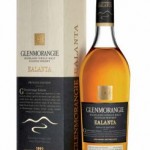 One of our members attended a Glenmorangie tasting at The Wine Merchant (Clayton, MO). They tasted these expressions:
One of our members attended a Glenmorangie tasting at The Wine Merchant (Clayton, MO). They tasted these expressions:
10 Year Glenmorangie “Original” 43% abv
12 Year Glenmoranige “LaSanta” 46% abv Sherry Cask Finish
12 Year Genmorangie “Quinta Ruban 46% abv Port Cask Finish
12 Year Glenmorangie “Nectar d’ Or”46% Sauternes Cask Finish
19 Year Glenmorangie :Ealanta” 46% abv Matured in Virgin oak casks
Here are his notes from the event:
The Glenmorangie tasting last evening (2-27-2013) was terrific, absolutely terrific. Gregor Mina, the master of ceremonies, is from Scotland and has lived in Chicago for the last three months. His job is touring the U.S. telling people about Glenmorangie. What a job, huh? Also, I definitively learned how to pronounce the name of the distiller. It’s like the tropical fruit — it’s Glen-morangee (at the end, a soft “g” with a long “e”). There were lots of jokes and lots of fun mixed along with discussion and even whiskey education. He talked about the characteristics of the wood they desire in their barrels.
Each year they must buy annual harvest leases on swaths of the Mark Twain Forest in Missouri. They own the casks before they are used to produced American bourbon even though they are later shipped to Scotland after their American use. When they reach Scotland they are considered “first-use” casks even though they have already produced bourbon. They will use each cask twice making scotch and blend the whiskey from the first and second use casks. When selecting wood for the casks, they look for the most porous oak that had done most of its growth in late winter or early spring.
He went on to say that the whiskey with the most consistent flavor year-to-year was “Original” Glenmorangie. It was the smoothest of the lot, but not the most flavorful. For some, it is their go-to whiskey for everyday drinking. The women of Scotland often drink it as a cocktail with sugar and bitters. It is a fine, pleasant scotch. (The 4 million people of Scotland drink as much scotch as the 315 million of the U.S.)
Of the next three (we drank them in the same order as the list above), my favorite was the “Nectar d’ Or”. Great flavor. They use French sauternes casks which are grossly expensive. They pay about $180 U.S. for the bourbon casks; they pay $1,500 U.S. for each of the French sauternes casks. In the past they had some problems with the Spanish supplier of casks for the Quinta Ruban; unannounced they started sending to Glenmorangie the casks from older-aged port. They thought they were doing Glenmorangie a favor, but really it produced an inferior scotch.
The most interesting of the evening was the last, the Ealanta. It is limited release and will only be available this year. They simply do not have any more in casks back in Scotland, and it is aged 19 years. There are several unique qualities in this scotch. It is aged in virgin oak casks harvested in Missouri’s Mark Twain Forest. No prior bourbon use — from the Missouri forest to the cooper and then directly to Scotland. He said this scotch is as close as you are going to find made in a bourbon style. It also has a very long finish; Gregor claimed the finish was over 20 seconds. It has sold out in much of the U.S., and no more will be produced. Cost $102.
Bill T. #23
P.S. Questions were asked about using water or ice. Here’s Gregor’s opinion. Using ice will release the heavier “base” flavors of the whiskey and mask the lighter flavors. Using a drop or two of water will release the lighter flavors but mask the base flavors. This is due, he said, to a chemical reaction with the water that releases the fatty amino acids when added. Adding any more than a drop or two of water just washes out the flavors. Water in ice does one thing, and water at room temperature does another. OK… that’s what he said.
Someone asked about adding a drop or two of the actual bog waters from Scotland in your scotch. His answer was, “A fool and his money are soon parted.” However, he said do not use chlorinated tap water. It was important to use distilled water.
And, yes, there are only 16 Men of Tain that produce this whiskey. It is considered a high honor to be one of the Sixteen. Several of them have the tips of a few fingers missing where they were crushed by the rolling casks.


One Response to Glenmorangie Tasting